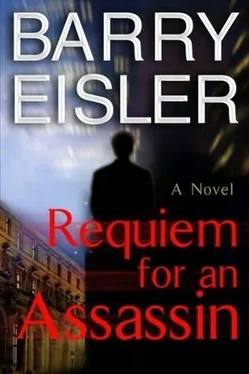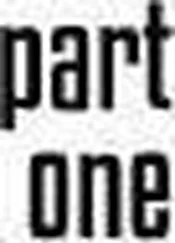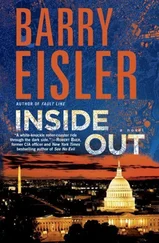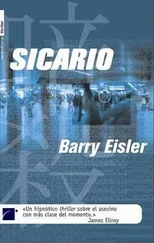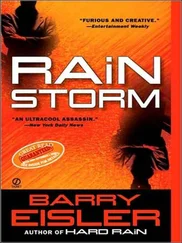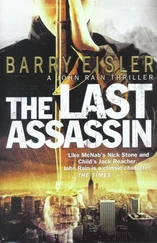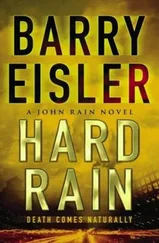I walked through the parking lot looking for Jannick’s car, according to Hilger’s dossier, a black Volvo S80. I didn’t see it. I wondered if he was out at a meeting. Or if he’d left early for the day and I’d missed him on his way home. Or if he was traveling somewhere. In my experience, every predictable pattern you’ve analyzed goes to hell the moment you go operational. Imagination, backup plans, and an ability to improvise are the only countermeasures.
I thought about calling him from a pay phone, but didn’t like the idea. I might come away with a better understanding of where he was, or even if he was in town right now, but I’d have to engage him or someone else with a story, too, leaving another potential piece of evidence for later. I decided to wait until a call would likely be more valuable.
I headed toward Jannick’s building. As I got closer to the entrance, I saw that the windows next to the entrance doors were coated with some reflective material. There was a sign stuck to the window. It was too far for me to read from this distance, but I had a feeling it warned of CCTV monitoring. A security camera there, rather than in the parking lot, made sense. It was the building and what was inside it they’d want to secure. They didn’t care about employees’ cars.
I turned and walked away, considering. With a camera, I couldn’t get to him in or directly in front of the building. That still left the parking lot. The problem was, to make a death look natural, you need some temporary control over the environment. If all that was required was walking up to Jannick and shooting him, I could have done it almost anywhere, the only real concern being escape. But I was going to need a few minutes alone with him. The parking lot wasn’t great for that.
I kept walking. The light was fading from the sky, and it wasn’t yet five o’clock. At this time of year, almost no one left work before nightfall. In the dark, I might be able to drag him behind his car, depending on where he was parked. But unless it were especially late and deserted, there was a worrisome chance that the person whose car was parked next to us might choose just that moment to head home, too. Plus, even the relatively clueless tend to be somewhat vigilant in parking lots at night. I could overcome that with Jannick, but if there were other people in the area, they’d likely be more watchful than I wanted.
Morning offered the opposite range of risks and benefits. On the one hand, people arriving at work are distracted by thoughts of the morning meeting, the day’s tasks, what messages might be waiting for them. And parking lots aren’t threatening in the morning, so no one pays any attention to their surroundings in them, anyway. But unless Jannick showed up for work very early indeed, it was hard to see how I could count on the privacy I needed. And then there were all the windows of all the buildings…even aside from the possibility of one of Hilger’s men lurking behind one of them, if just one person happened to be looking out at the parking lot at the wrong moment, there would be an eyewitness to the decidedly unnatural manner of Jannick’s demise. Hilger and I hadn’t discussed what would happen if Jannick’s death was a success but its manner a failure. It didn’t matter. I wasn’t going to take the chance.
I walked another mile or so down East Bayshore, getting a feel for the area, its rhythms and rituals, what fit in and what might seem subtly out of place. My sense was that the neighborhood was transitional-office buildings on the south end, a new IKEA and shopping mall at the other, a trailer park and long-term storage facilities in between. Blending wasn’t the problem here. The problem was access, and control.
I thought about using light disguise to enter Jannick’s building. There might be opportunities inside-a restroom, a fitness facility, a closet. Somewhere Jannick’s guard would be down and I could hold him long enough to do things the way they needed to be done. But I hated to create a connection between myself and the place where he worked, especially if that’s where he was going to die.
I walked back to the Mercedes, cutting once again through the parking lot on the way. Jannick’s car still wasn’t there. It was dark now, but there was a lot of light from streetlamps. I was going to have to find a better place.
I drove back to Jannick’s house. Still no car. Then back and forth again. I used slightly different routes each time, and after five such trips, I started to feel I had a reasonably good feel for the layout of the streets, the patterns of traffic. Within that layout and those patterns, there would be possibilities. There always were. Sometimes I recognized them immediately; sometimes I had to sleep on it first, and let my subconscious work the problem.
Sleep. I needed to get up early tomorrow to make sure I could catch Jannick before he left for work. And the time zone shifts were getting to me. It was time to call it a day.
I stopped at a phone booth in a gas station and checked the Yellow Pages, where I found a hotel called the Stanford Park. Menlo Park, the next town over. I called and was glad to hear they had a vacancy, a king room with a fireplace. No smoking, the clerk said apologetically, perhaps in response to the Japanese accent I was using. No problem, I assured him. No smoking was fine. It was only available for two nights? That would be fine, too. I didn’t plan to be in town any longer than that.
I purged the car nav system before checking into the hotel, then had an excellent dinner at a place called Café Borrone, about a mile down the road: salad, lasagna, and a wonderful Napa Valley Cabernet called Emilio’s Terrace, which, as globalization would have it, I had discovered a year earlier in Bangkok. The restaurant itself was a lively place, a bigger, smoke-free, California version of some of the Left Bank cafés I liked. There was a huge independent bookstore next to it, Kepler’s, and after dinner I strolled among its offerings for a while, watching the people, absorbing details. Everyone looked so prosperous and satisfied and well intentioned. I felt like some secret foreign matter among them, a virus in the system, a germ in an operating room.
I asked one of the employees, a pretty woman named Cynthia, about Internet access. She directed me to the public library, less than a quarter mile away. I strolled over and checked the bulletin boards. Nothing.
The last thing I did before falling into an exhausted sleep was fire up my old cell phone and check its voice-mail account. There was a message from Delilah. “Don’t push me away like this,” she said. “Call me, please.”
I didn’t. I couldn’t. I had to stay focused. I had to be who I always was.
I GOT UP at five o’clock the next morning, showered, shaved, fueled up on eggs and coffee in the hotel’s restaurant, and went out. Unlikely that Jannick, or anyone else, would get to work this early, but still I drove past his parking lot to start with. It was deserted. Next, I stopped at a Starbucks in the shopping center at the other end of East Bayshore. I ordered a Venti Latte, wondering why they couldn’t just call the damn thing a large, and dumped the contents in a drain a little ways from the store. It was the cup I needed: first, because I’d noticed that just about everyone in Palo Alto walked around attached to a Starbucks coffee, and carrying one of my own would make me look natural. Second, and more important, I didn’t know how long I might have to wait for Jannick, and although no one was likely to pay attention to a quietly parked Mercedes, they might be discomfited by the sight of a man repeatedly stepping out of it to urinate on the curb.
I drove by Jannick’s house. There was still no car in front, but my guess was that it was in the garage. The sun was just coming up, and the house was dark. I drove down to OPM and parked in my spot. I couldn’t see his house from here, but I’d catch him when he pulled onto Page Mill.
Читать дальше
